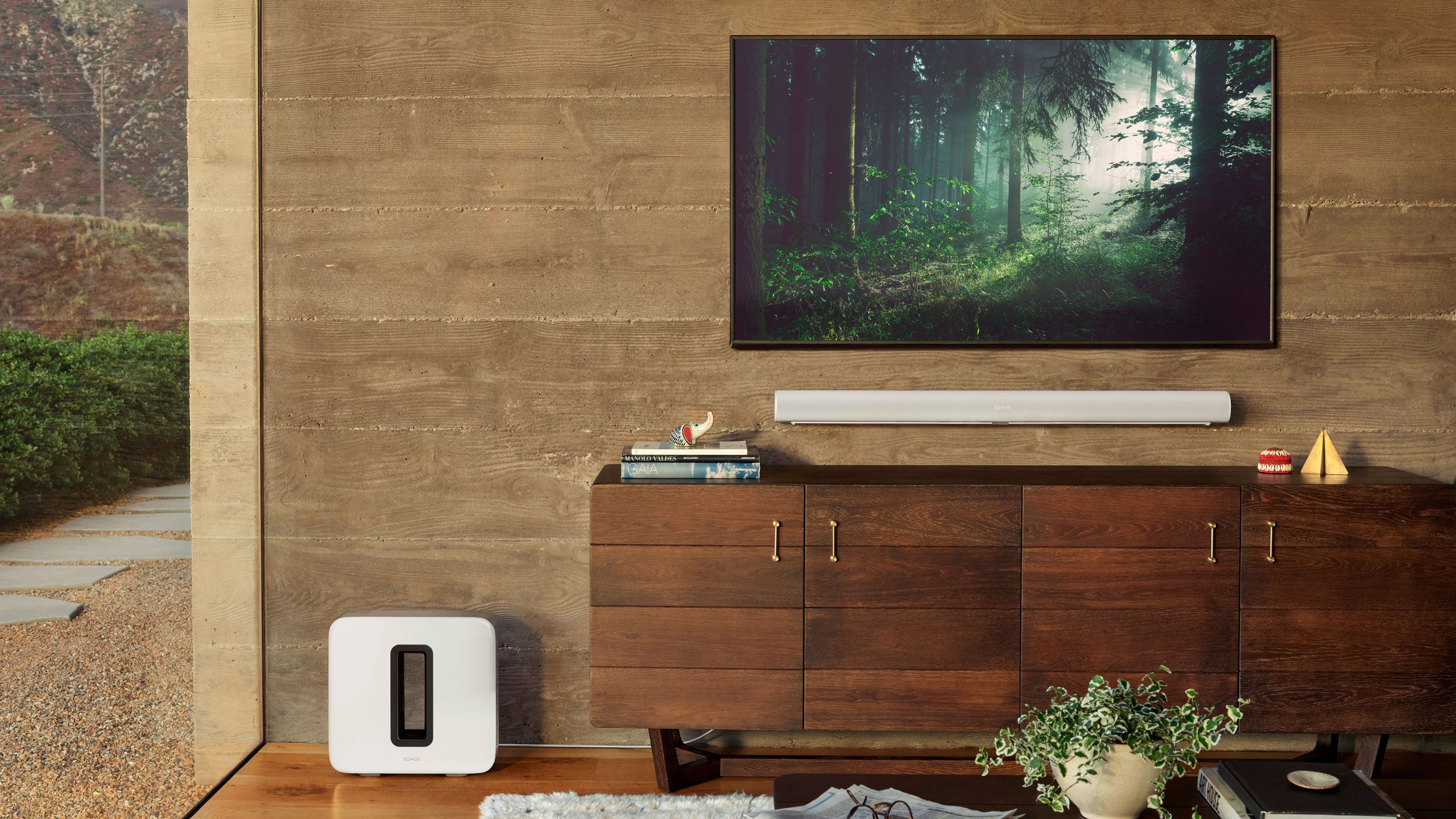Bought a TV over the holidays? Here’s why you need to add a soundbar
Few things are sweeter than the moment you turn on a new television. Mounted on the wall, or balanced on a media unit, when the light comes on and – after a brief period of logging into all of your many streaming services – the images start to play.
It’s a shame, then, that the average TV – even the good-looking ones – often can’t compete when it comes to sound. And if you’ve bought one of the best 4K TVs over the holidays, you may want to consider supplementing your purchase with a soundbar.
Good audio is often an afterthought for TV brands, who primarily focus on picture processing and panel quality as the main markers of success. Cheap TVs can ship with 10W of tinny stereo sound, or clunkily-applied bass, meaning that a dedicated audio solution can make a massive difference to the quality of the sound on offer.
Even high-spec models like the LG C2 OLED, which excel in the picture department, can’t quite offer the same experience in their speakers. The C Series OLED packs in 40W of power, with 3.1.2 channel speakers, but this is still a fraction of what’s possible with an extended audio setup.
Some TVs are better than others in this regard, of course. Samsung’s OTS (Object Tracking Sound) speaker arrays pack multiple drivers into their high-end, Neo QLED models, offering a kind of built-in surround sound matched to the action on screen. And generally, the fancier the TV you buy, the better the built-in audio.
But most TV buyers will find that their audio is probably on the thin side, and that you don’t need to break the bank to fix it.
A world of sound
It’s hard to articulate how much of a difference good audio makes to a viewing experience. While it might not be as crucial for the news at 10, a Netflix movie or nature documentary can be elevated to new heights with the audio detail that a good soundbar is capable of: the creak of a floorboard, the patter of raindrops on a leaf, the underlying rumble of a far-off explosion, or the crack in someone’s voice while they argue with their lover.
All these things can be missed in basic audio setups, robbing us of the complex sound design and rousing music that directors and composers intended for the content on your screen.
The added breadth and height of multi-channel soundbars can also help situate sound in its environment – one of Samsung’s early OTS demos showed a volley of arrows descending on a battlefield, the whip of air around each projectile getting firmer and closer to the viewer with each moment.
But you don’t need to be an expert audiophile to get this benefit. Plug-and-play soundbars are easy additions to a home cinema setup, connecting through an HDMI port and giving the soundtracks from movies, TV shows, documentaries and news some extra sonic impact.
Flexible connections

Standard stereo sound effectively has two channels – right and left. That’s nothing compared to the extensive driver arrays you can get in a soundbar, from smaller 3.1.2 channel setups to 7.1.2 surround sound that lets you hear all the highs, lows and mids you can possibly squeeze out of movie soundtracks.
What does 7.1.2 even mean, you ask? That first number ‘7’ is the number of main speakers involved, whereas the second number ‘1’ is the number of subwoofers, and the last number ‘2’ is the number of upward-firing speakers. Generally, you want that first number as high as possible, but a quality speaker with fewer channels should still be well worthwhile – as long as it is actually improving on what your TV screen’s built-in drivers are capable of.
One big benefit of a soundbar is that it isn’t built right into the television – meaning you can move it between different screens, in different rooms or homes, while also owning a piece of audio kit with the potential to outlive a TV upgrade. Just because you trade in an old LCD screen for a fancy new OLED, doesn’t mean you need to start your audio setup from scratch.
A soundbar doesn’t need to be limited to a single device, either. Many models come with designated subwoofers, or the ability to connect to a variety of other speakers in tandem, allowing you to experiment with surround sound setups around your home cinema space. They can also be used outside of TV watching, often with Wi-Fi or Bluetooth connections to link up with your phone, for use as a party speaker or similar.
What you need in a soundbar

It is crucial to make sure your soundbar works in tandem with a TV’s specification. Having a brand new Dolby Atmos soundbar is all well and good, until you realize your TV doesn’t support Atmos passthrough – meaning that a film’s Atmos-encoded soundtrack won’t be picked up by your hardware.
Most soundbars will connect through HDMI – though generally you want the HDMI ARC (audio return channel) specification, which allows for easy two-way communication between a TV and soundbar. HDMI eARC (enhanced audio return channel) builds on this further with improved data transfer, allowing for higher-quality audio to be passed from one device to the other.
Some models, like the budget Sonos Ray, use an optical digital connection port instead – a widely used specification, but something you should make sure is oon your television before buying regardless. Optical connections can’t carry quite the same load of audio information as HDMI ARC or eARC, and don’t support immersive formats like Dolby Atmos. So if you’re intent on hearing Dolby Atmos or DTS:X soundtracks, you’ll need to opt for one of the HDMI standards – specifically HDMI eARC to hear them in their best, non-compressed state.
What soundbar should I buy?
Your budget for a soundbar will come down to how important improved audio is to you, as the price for a soundbar can be as high or low as almost any television on the market today.
To help you choose, we’ve collated a mix of the best soundbars we’ve seen at every budget below.
For all the latest Technology News Click Here
For the latest news and updates, follow us on Google News.
